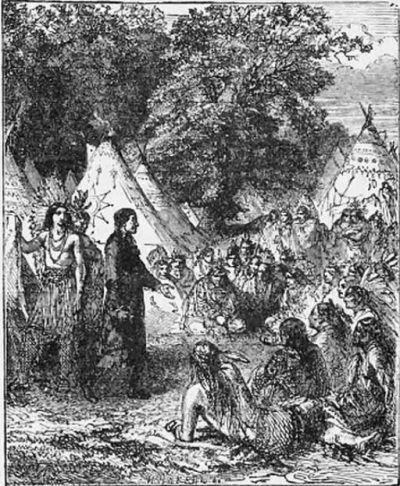Indigenous Peoples Day vs. Columbus

Today I’m in Boston where evidently Indigenous People’s Day is an official holiday instead of Columbus Day. Every year at this time there are bewailings about honoring Columbus. This piece manages to compress nearly every single contemporary grievance about America, especially its conservative Christians, into a cannonball aimed at Christopher Columbus. Here’s one typical sentence:
"Disturbingly, this belief in America as a divinely ordained white Christian nation — which has blessed so much brutality in our history — remains linked to denials of our past and support for political violence and anti-democratic sentiment in the present."
The author also cites the “Doctrine of Discovery,” a mythical conspiracy tracing every European crime of the last 500 years ultimately to the papacy. Apparently, even Protestants were compliantly part of the web.
This narrative insists America and Western Civilization are the focus of evil in history. Christianity is also to blame. Some advocates for “Doctrine of Discovery” date their historical conspiracy all the way back to Emperor Constantine legalizing Christianity in the Roman Empire. We must repent for 1700 years! As one repentant churchman noted, that’s a lots of sorrys.
Judaism and Christianity teach that humanity is fallen and needs divine redemption. In contrast, these historical conspiracies imagine the world is largely okay but corrupted by particular religious and political forces deemed sinister at the moment. In this way 21st century American evangelicals can be faulted along with 15th century popes and maybe an ancient Roman emperor.
European civilization is bad but “indigenous people” are good, the modern myth makers insist, agreeing with 18th century Enlightenment philosophers who also believed “primitive” natives were more noble because untouched by “civilization.”
But “indigenous” is a dubious category. No people is truly native. All peoples have been migrating and intermingling for thousands of years. The original peoples of the Western Hemisphere reputedly came from Asia. They were divided among thousands of tribes that evolved across millennia.
Like all other peoples these “indigenous people” waged war and conquest among each other for thousands of years before Columbus’s arrival. Like everyone else they committed genocide, practiced slavery, were imperialists and thought themselves superior to other peoples. According to Christian teaching, they were by nature as depraved as everybody else in Europe, Asia and Africa.
Romanticizing “indigenous peoples” resembles what is ascribed to “Christian nationalism” today. It mythologizes the folk ways of one category of people distinct from others. But fallen human nature is universal. Particular cultures may have special attributes. But all are equally susceptible to every form of human vice, debauchery, greed and cupidity.
The biblical narrative rejects that some people are intrinsically superior to others or dropped down out of heaven with special advantages. All peoples are of one flesh and equally carry God’s image. And all peoples by their sinful natures are prone to deny this dignity to others what they expect for themselves.
“Indigenous people” like other peoples didn’t much respect or worry about the people they conquered, enslaved or exterminated. They didn’t have special holidays to honor or to apologize to their victims. Most peoples in their natural states in every culture valorized conquest, strength and subjugation. The defeated, the enslaved and the victimized were weak and deserved their own karma, according to the cosmos as they understood it. Everyone so assumed for thousands of years.
The cult of the victim was the invention of Christianity, which of course literally worships a victim who willingly died on a cross to atone for the sins of the world. This concept was and is revolutionary and transformative. God uses weakness to humble the strong, and the last shall be made first, completely counter to what the world naturally assumes.
Those Europeans who came to the Western Hemisphere starting with Columbus were in no way naturally superior to the people already here whom they displaced and conquered. But they did carry with them a faith, too often unheeded or distorted, that the people they conquered were their equals before God. Sometimes some of them in their better moments reflected on this premise and tried for a time to act accordingly.
Eventually laws and customs began to recognize more fully the human equality and dignity the Gospel teaches. But no society does now or ever lived up fully to its demands. Yet its witness continues to challenge and transform.
Today’s politically correct preoccupation with “indigenous people” as victims is a largely unacknowledged legacy of Gospel concern for the defeated and the exploited. This impulse is socially constructive within a wider appreciation of universal human nature. Everybody is a potential victimizer.
But the biblical understanding of all persons bearing God’s image must be credited with today’s demand for equality and justice for all. Humanity is not naturally prone to decency and fairness for all peoples. The Gospel by divine power has universalized the expectation of protection for the weak and restraints upon the strong.
Columbus Day, which some now call Indigenous Peoples Day, could be a reminder not of human glory or pretended innocence, but rather of Divine Providence’s redemptive acts in history and throughout the world today.
Originally published at Juicy Ecumenism.
Mark Tooley became president of the Institute on Religion and Democracy (IRD) in 2009. He joined IRD in 1994 to found its United Methodist committee (UMAction). He is also editor of IRD’s foreign policy and national security journal, Providence.




















